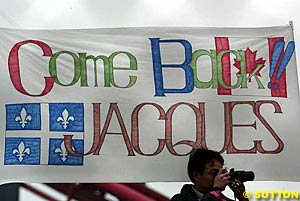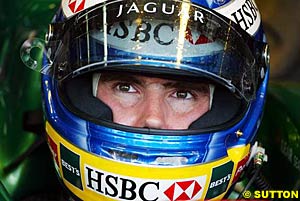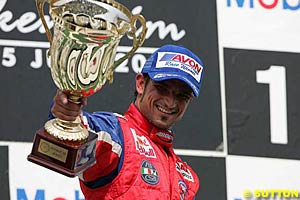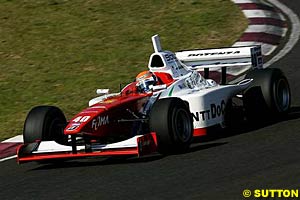
Atlas F1 GP Editor
You would think that with such a sweeping change for 2005, a wave of new talent would roll into the sport, but instead it's the same drivers that are moving around to different teams and, worse still, names from the past of drivers who retired or should have retired pop up as candidates for a return. Is there no more talent on the steps leading to F1? Or has the sport become too conservative? Atlas F1's David Cameron takes a look at the recent trends
By a remarkable coincidence, the majority of the race seats in Formula One are up for grabs for next year. At the start of the year the following drivers had a contract for 2005: Michael Schumacher and Rubens Barrichello at Ferrari, Jenson Button at BAR, Fernando Alonso at Renault, Kimi Raikkonen and Juan Pablo Montoya at McLaren, and Felipe Massa at Sauber.
To this list you can now add Ralf Schumacher, Mark Webber and Giancarlo Fisichella, as these drivers have since signed contracts with new teams (Toyota, Williams and Renault). The latter two had existing contracts with their teams, but had a get out clause to move up the grid when opportunity knocked.
As of the start of August there are a remarkable ten seats still available for 2005, and the silly season is in overdrive pumping out rumours of which drivers will fill them. Not so long ago this many vacancies on the grid would have guaranteed a number of new drivers being given the opportunity to confirm the promise they've shown in the junior categories on a bigger stage, but the current state of Formula One mitigates against that happening again.
And the reason for this is money.
The amounts of money that are being spent in Formula One today are astonishing - there are now four teams who have an annual budget in excess of 400 million dollars each (Ferrari, Renault, Toyota and McLaren), and obviously the higher the budgets go the higher the expectations are for a return on those funds. Most teams now literally cannot afford to take what they consider to be a risk.
It is also why the names Hakkinen and Villeneuve can come back into play - both men have managed to beat Michael Schumacher to the title in the past, and in a year when the German has won all bar one race, that is a big positive for both men, even if it is questionable as to whether either could repeat the feat on return to a sport that has already moved on since they last sat in a car.
Hakkinen, apparently bored in Finland after two years away, has asked his good friend Ron Dennis for his advice (and blessing - there was a contract in place that gave McLaren first call on the Finn's services should he return) on a potential move to Williams. Villeneuve was forced to sit this year out when no one picked up his services for 2004, and is known to be keen to return.
Given the inherent conservatism of those pulling the purse strings in Formula One, both former Champions have a chance at a return, but should they? Should the series welcome with open arms a man who wants to return because he's bored, and another who no team boss thought worth signing last year? Both are certainly well known, and would bring in a lot of publicity, but is that enough to justify holding somebody who could potentially do a better job out of the series?
The other side of the money equation is that it is now almost essential for a young driver to have access to large amounts of it to get into Formula One - if the large teams are too financially conservative to bring untested talent into the sport, then the corollary of that is the small teams need funds from anywhere they can get it to try and keep up with the spending spree going on around them; this means that drivers are seen as a legitimate source of revenue.
Giorgio Pantano was seen as one of the stronger drivers below Formula One, and yet it took him three years in the holding bay of Formula 3000 before he found enough money to buy into a Jordan seat. It wasn't money well spent - the car looks evil, and his career is effectively finished after one season in the big time unless his manager can find more backing. Both drivers at Minardi brought a budget as usual, but unusually Jaguar second driver Christian Klien had his way smoothed by Red Bull's Euros.
There are a large number of drivers outside of Formula One looking for a way in, and the vast majority of them are simply not up to the job - those who suggest that anyone could drive the modern cars well simply hasn't had any access to the cars in any form. The modern Formula One driver has a very specific style that he needs to adapt to in driving the cars, has to have a remarkable level of fitness and ability, as well as a phenomenal work ethic to keep up with the demands that come from 18 races as well as testing and public relations demands. It is much more than a full time job - it is a life.
Timo Glock, the young German who is the third driver for Jordan fresh from European Formula 3, may not have had high hopes for his year considering the lowly position of his new team, but fortune smiled on him with the misfortune of teammate Giorgio Pantano, when a storm in a teacup kept the Italian out of the race in Canada and gave Glock his chance at a race seat - he grabbed it with both hands and, through a combination of good driving and good luck, brought home two valuable points on debut.
Both men have proven their abilities to drive a Formula One car, and are clearly strong racers that would be worthwhile additions to the field. However, they run the risk of falling into the testing ghetto - Anthony Davidson is young, personable and bloody fast, and yet he is now in his third year as test driver for BAR despite a junior racing record that is actually superior to friend and team leader Jenson Button.
Davidson's long term manager Didier Stoessel has now sold part of his contract to management double act David and Steve Robertson (managers of Kimi Raikkonen and on/off/on again for Button), acknowledging that he can only praise his client for so long before it falls on deaf ears, and that a fresh voice (or two) was needed. There are ongoing talks with a few teams, but a lack of budget is, again, doing him no favours if he wishes to avoid falling back on his existing testing contract for next year again.
Even further afield Richard Lyons, the young driver from Northern Ireland who is hoping to follow in Eddie Irvine's footsteps, has claimed five out of six poles in this year's Formula Nippon, the Japanese equivalent of Formula 3000 which used to be a particular favourite of up and coming drivers (Irvine, Ralf Schumacher, Mika Salo and Ralph Firman have all come through the ranks of Nippon) but perhaps isn't getting the publicity it once did. That he has achieved this with a team whose performances in the past have been Minardi-like makes it even more remarkable.
Are there any guarantees that any of these young drivers could step up into a Formula One race seat and perform? No, but equally there are none that Hakkinen or Villeneuve would either. Wirdheim, Glock and Davidson have strong racing credentials as well as a year or more under their belts in Formula One cars and have learnt all of the circuits - these are strong credentials for any young, keen driver to be given a chance to prove themselves in the top flight.
The advantage that Wirdheim and Glock have is that their existing teams are aware of their abilities, and both teams will have at least one race seat available next year. The disadvantage is that neither team is exactly flush with funds right now. With ten seats available there is everything to play for, and as Wirdheim's manager Christian Horner noted it is just a case of “banging on doors, pointing at his record and showing them the laptimes from this year.” And hoping that talent will suffice in place of budget.
Liuzzi has generated a lot of buzz in the Formula One paddock, aided in no small part by manager Peter Collins (the former team boss of Lotus). “Tonio's results this year have been good, and we are certainly looking for a race seat in Formula One,” he noted in Germany, “but do we turn down a testing spot? It all depends on the team.” As Collins noted, his results certainly justify giving him a chance. That he has some backing from soft drink giant Red Bull isn't doing his case any harm, either.
With the above drivers, and others like Jamie Green and Nico Rosberg making names for themselves in European Formula 3 below them, there are drivers outside of Formula One who are more than worth looking at. If fiscal conservatism dictates that young drivers need to prove themselves in a Formula One car before being given a race seat, then the third driver Friday sessions are a perfect answer for wavering team bosses to both have their cake and eat it - give them a shot on Friday, and if they work out move them up a year later.
The sport's fans are its lifeblood, and the only way it will have a future is to introduce some new names from time to time to give the fans someone new to get excited about. In a period when the sport could use a shot in the arm to reignite interest - if two of the last three seasons have been judged as boring by the existing fans, what chance is there to bring in new ones? - it would be the worst thing that could happen to the sport if its next collection of heroes are priced out of the game.
Michael Schumacher has stated in the past that he will continue to drive until he stops enjoying it, or a young driver comes along and beats him. Would an older driver have the incentive to beat him, or are they looking for one more paycheck and a year away from the couch in front of the television? In a year where so many seats are available, perhaps it's time to look for motivation, as well as economical wages, from the guys pushing up from below.
That Jacques Villeneuve and Mika Hakkinen are being considered by some fans and, perhaps, some teams for a drive next year - in what will see to the biggest driver shake up in years - speaks volumes about the inherent conservatism of the sport today. Both drivers won a Championship or two, of course, but Hakkinen has been out of racing for three seasons (some would say four, given his 2001 season), while Villeneuve has missed one year and hasn't won a race for seven.
 In a sport where you're only as good as your last result - witness Jarno Trulli shifting from being the new hero for winning in Monaco to being apparently unable to renegotiate with Renault for next year after one bad result in France - these periods away from the sport should be fatal. It shows up a strange characteristic of modern Formula One, and it's not a pleasant one - one mistake makes a driver a fool forever unless you are bathed in the soft lights of a Championship, no matter how long ago it came to you.
In a sport where you're only as good as your last result - witness Jarno Trulli shifting from being the new hero for winning in Monaco to being apparently unable to renegotiate with Renault for next year after one bad result in France - these periods away from the sport should be fatal. It shows up a strange characteristic of modern Formula One, and it's not a pleasant one - one mistake makes a driver a fool forever unless you are bathed in the soft lights of a Championship, no matter how long ago it came to you.
 Which is why this year's driver market looks like nothing so much as a shuffling of the deckchairs on the top deck of the ocean liner - drivers like David Coulthard and Ralf Schumacher may not win Championships (and their careers to date suggest as much), but equally they are regarded as solid drivers who won't make too many mistakes and may even, on their day, claim a win or two, and as such have an appeal to those controlling the purse strings of Formula One.
Which is why this year's driver market looks like nothing so much as a shuffling of the deckchairs on the top deck of the ocean liner - drivers like David Coulthard and Ralf Schumacher may not win Championships (and their careers to date suggest as much), but equally they are regarded as solid drivers who won't make too many mistakes and may even, on their day, claim a win or two, and as such have an appeal to those controlling the purse strings of Formula One.
 This doesn't mean that there are no drivers worthy of a chance at the big time, but few of them now have access to the amounts of money required to buy their way into Formula One. One advantage of the new rules regarding third drivers on the Friday of a Grand Prix weekend is that it has given a chance to younger drivers to prove their ability in a Formula One car against a known quantity. Bjorn Wirdheim proved his racing credentials by claiming the Formula 3000 championship last year, and this year has done a solid job in the same team as a driver who is being tipped for future glory - anyone who has read his column oin Atlas F1 will have seen his approach is positive and, more importantly, is working.
This doesn't mean that there are no drivers worthy of a chance at the big time, but few of them now have access to the amounts of money required to buy their way into Formula One. One advantage of the new rules regarding third drivers on the Friday of a Grand Prix weekend is that it has given a chance to younger drivers to prove their ability in a Formula One car against a known quantity. Bjorn Wirdheim proved his racing credentials by claiming the Formula 3000 championship last year, and this year has done a solid job in the same team as a driver who is being tipped for future glory - anyone who has read his column oin Atlas F1 will have seen his approach is positive and, more importantly, is working.
 Outside of the Formula One paddock Italian Vitantonio Liuzzi has dominated this year's Formula 3000 Championship, winning all bar one race and leading commentators to compare his dominance to that of Michael Schumacher in the senior paddock. At his only Formula One test to date, in late 2002 with Williams, the team were astounded that he was able to sit in a car he had never been near, at a track he had never driven, and be able to run within a second of Montoya after just a few laps.
Outside of the Formula One paddock Italian Vitantonio Liuzzi has dominated this year's Formula 3000 Championship, winning all bar one race and leading commentators to compare his dominance to that of Michael Schumacher in the senior paddock. At his only Formula One test to date, in late 2002 with Williams, the team were astounded that he was able to sit in a car he had never been near, at a track he had never driven, and be able to run within a second of Montoya after just a few laps.
 Lyons is being promoted by former F1 driver and paddock regular David Kennedy, who has stated that he will be looking for his charge to be given at least a Formula One test later this year, after which it will be clearer as to his abilities in the senior category. Don't be surprised if this test is with Renault, who have a sponsor in common with the Ulsterman - sponsors are always looking for some return on their money.
Lyons is being promoted by former F1 driver and paddock regular David Kennedy, who has stated that he will be looking for his charge to be given at least a Formula One test later this year, after which it will be clearer as to his abilities in the senior category. Don't be surprised if this test is with Renault, who have a sponsor in common with the Ulsterman - sponsors are always looking for some return on their money.
|
Contact the Author Contact the Editor |
Please Contact Us for permission to republish this or any other material from Atlas F1.
|
Volume 10, Issue 31
Atlas F1 Special
The Stars Align
Boy Wonder
In Search of the Holy Grail
Chemistry Cocktail
The Conservative Party
The Reshuffle: Facts & Stats
The Reshuffle Trivia Quiz
Columns
On The Road
Elsewhere in Racing
The Weekly Grapevine
> Homepage |
